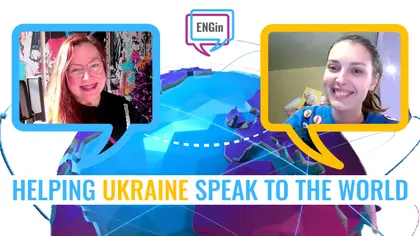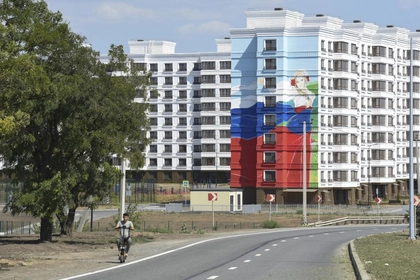Though Donna Thompson and Sasha Shevchuk have never met, they would describe themselves as “the best of friends.” Every Sunday, Donna, a retired speech pathologist from Long Island, New York, Zoom calls Sasha, an attorney living in Vinnytsia, Ukraine.
Together, they watch Netflix shows, engage in debates about Ukrainian geopolitics, and share their favorite cultural traditions with one another.
JOIN US ON TELEGRAM
Follow our coverage of the war on the @Kyivpost_official.
“Sometimes we cook Ukrainian dishes together like kutia [a traditional Slavic winter holiday dessert made with wheat berries] and varenyky [Ukrainian dumplings, with savory or sweet fillings], and Sasha always remembers to wish me a Happy Fourth of July or a Merry Christmas,” Donna says.
“Through our meetings, I think we have both learned to be more sensitive to differences in our cultures and to be more open to learning those.”
But beneath the surface of their relationship lies a shared commitment extending beyond friendship alone: a dedication to Ukraine’s freedom through the study of the English language.
Through their weekly meetings, Donna, a volunteer tutor, works with Sasha to prepare her with the English language skills to succeed in an increasingly Western, English-oriented Ukrainian society.
Beyond her own career goals, Sasha’s motivation to study English reflects a broader movement in Ukraine: “Ukrainians have long set their course toward global development, separate from Russia” she says. “English helps us to do this.”

IMF Approves $1.1 Billion Loan Disbursement to Ukraine Before Trump Inauguration
These objectives lie at the heart of the ENGin program, the nonprofit organization responsible for cultivating relationships like Donna and Sasha’s. Established in 2020, ENGin is committed to offering free one-on-one English lessons to Ukrainians aged 9 and 35.
ENGin’s founder and CEO, Katerina Manoff, a Ukrainian-born, Maryland-based educator, explains that she originally started ENGin “after recognizing the scale of demand for accessible English instruction in Ukraine” where English proficiency and quality of education rank among Europe’s lowest.
“I decided we were not going to stop until we made English fluency the norm in Ukraine,” Manoff says.
Today, ENGin has grown as an organization for change in scale, accessibility and objectives.
From an economic perspective, Manoff explains that English fluency will enable Ukrainian people and organizations to take the steps key to rebuilding Ukraine’s economy: forging international partnerships, cultivating business relationships, attracting foreign investment and tourism, and tapping into a wealth of information on the Internet.
The magnitude of this mission has become more pronounced since the start of the war, with the program growing from 6,000 students just prior to February 2022 to over 20,000 today.
Manoff attributes this swell to the heightened demand for English proficiency after the conflict forced many Ukrainians out of jobs and educational institutions. For those who had to flee Ukraine to start anew, English “became a lifeline” for securing jobs internationally and pursuing further education.
Several students Manoff has encountered were given promotions or employment opportunities since the war began because of their studies with ENGin, such as a woman who had lost her job due to a factory bombing in Mariupol but managed to secure a new position at the US embassy because of her exceptional English skills.
After just a few months of English lessons with Donna, Sasha landed a job at a law firm, where her strong command of English made her stand out among numerous candidates.
Despite the national significance of the ENGin program, English lessons hold a different meaning for Sasha. “My communication with Donna is more than just helping me to learn English,” she says. “Our communication is more about international friendship.”
Since the onset of the war, Donna recounts providing emotional support to Sasha amidst the turmoil and exchanging perspectives on unfolding events in the conflict. This connection has also encompassed the burden of inevitable strain that arises from the war.
“In the middle of a session the screen would go blank and Sasha would unexpectedly lose electricity,” Donna says. “Or there were times when she had to postpone a session because she had to sit in a bomb shelter.
“She had sent me pictures of the bomb shelter, and after seeing those, I remember worrying so deeply for her the next time she was a few minutes late to one of our meetings.”
Despite these challenges, the pair’s determination to advance their study of English, and their friendship reflects the commitment of Ukrainians in their movement toward independence: “We never missed a week,” Donna says. “Not with missiles, bomb shelters, and lack of electricity. There is a total commitment on both parts.”
Yet, while the connections ENGin forges are undoubtedly invaluable, the operation does not come without its costs. Sustaining the growth of the program during the war without jeopardizing its accessibility requires significant funding, which Manoff described as “a brutal effort” to obtain.
She also highlights the challenges of operating with a staff primarily based in Ukraine, including balancing productivity with respect for workers' circumstances during wartime.
Despite Manoff’s reports of the ENGin team’s ambitions to launch even more specialized programs with the organization in the future, such as for IT professionals and Ukrainian doctors, the challenges that come with the war pose serious threats to ENGin’s longevity.
“We have to think about how we can transform the program on a national level,” Manoff concluded. “With ENGin, we are striving to help everyone — to make systemic change, and to work towards Ukraine’s freedom even after the war.”
While ENGin’s English language lessons for Ukrainians are completely free, they also offer Ukrainian language lessons for a fee which goes to support their free educational program.
You can also highlight the text and press Ctrl + Enter







